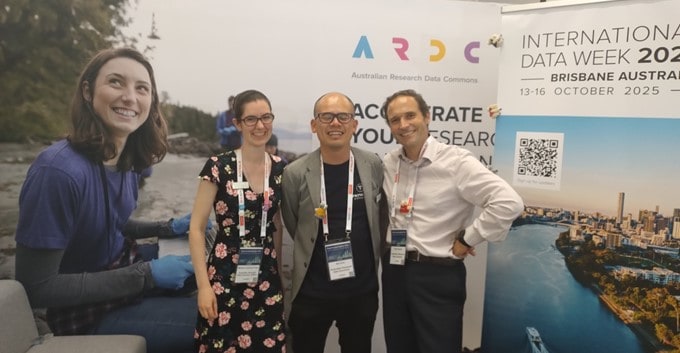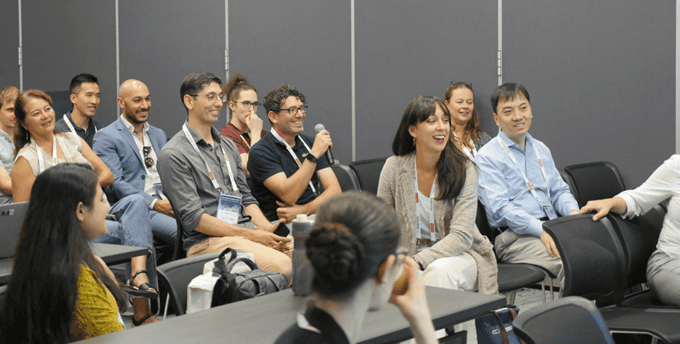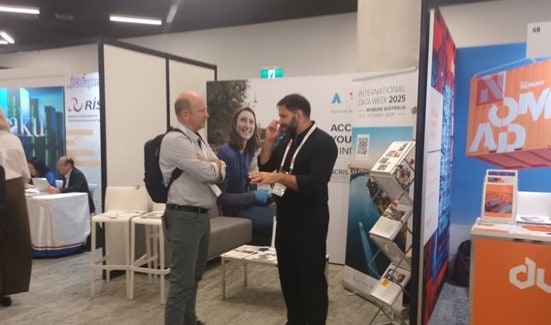
ARCOS Symposium 2024
Go to eventabout ARCOS Symposium 2024
SupercomputingAsia 2024 (SCA2024) was held in Sydney from 19 to 22 February 2024. This was the first time the conference was not located in Singapore, and it attracted a large and broad audience from the technology sector with many delegates and plenary talks discussing artificial intelligence (AI) and the impact it is having on the underpinning technology in the high performance computing (HPC) and digital research sector.
The range of talks and keynotes at the conference covered diverse topics, including climate change modelling, the importance of Indigenous data in healthcare, and vendors’ interest in research. These sessions offered a broad perspective on how technology and data can be applied to address different challenges.
There was a strong ARDC presence at the conference, headed by our Engagements, Expertise and Skills teams. We were excited to be part of the conference for the first time. Our involvement included:
Read on to learn more about what happened at SCA2024.

The ARDC was invited by our fellow national research infrastructure facility and lead organiser of SCA2024, NCI, to organise a skills and training track at SCA2024 and recruit co-chairs to facilitate 4 skills and training sessions. The skills track showcased the wonderful collaboration between the ARDC, Pawsey Supercomputing Research Centre, Intersect, QCIF and NeSI through the following sessions:
Skills Track session 1 – Harnessing HPC skills – Chairs: Ann Backhaus, Pawsey and Dr Nisha Ghatak, NeSI
Highlights:
Skills Track session 2 – Unlocking new possibilities through skills – integrating AI/ML & HPC – Chair: Dr Anastasios Papaioannou, Intersect
I don’t think we can any longer learn in isolation… The way to learn this is to socialise.
Gnana Bharathy, ARDC
Skills Track session 3 – A resilient research workforce – scalable and sustainable skills development programs – Chairs: Ann Backhaus, Pawsey and Dr Mark Crowe, QCIF
Skills Track session 4 – Supporting Computational Trainer Communities – Chair: Kathryn Unsworth, ARDC
Based on the impressive audience size, engagement and discussions from each session, there was keen interest in the session themes.
Key takeaways from the digital research skills and training stream were:
This digital research skills and training stream was led by the ARDC Skills team: Kathryn Unsworth, Liz Stokes and Meirian Lovelace-Tozer.

Through the ARDC booth at SCA2024, the ARDC’s manager of engagements, Dr Robin Burgess and other team members engaged with conference participants – researchers and vendors – to promote ARDC services and International Data Week 2025, which the ARDC will be hosting in Brisbane.
Researchers were interested in learning more about the ARDC Nectar Research Cloud, which offers a National GPU service and Preemptible Instances for high-end computing for researchers across Australia.
We also engaged with Weka, Vast Data, Dell, Panasas, Wasabi and IBM, all of which are doing excellent work in the area of HPC, AI, data centres, data storage and general data management.
Many visitors also told Robin that “the ARDC has the best merch!”
The event was an excellent opportunity for the ARDC to engage and learn more about those organisations that are working with and tackling aspects of HPC and AI.

Of particular note was the AeRO Forum on a reference architecture for research data storage systems. This is a piece of design work led by Prof David Abramson, University of Queensland and AeRO, as well as members of most of the large Australian universities and CSIRO. Dr Max Wilkinson, ARDC, has been part of this group since its inception and presented this work at eResearch NZ earlier in February. There was very positive feedback from the 100 participants who joined in a discussion on the draft reference architecture. These participants represented vendors, research institutes and many international delegates.
Once finalised, the reference architecture will provide input on effective infrastructure operations in data storage and retention for the ARDC’s Thematic Research Data Commons. We hope to make use of this sector-designed resource as our initiatives progress.
The ARDC’s specialist in ML and AI, Dr Gnana Bharathy, had many opportunities to share the Machine Learning Community of Practice for Australia (ML4AU Community of Practice), a community for those interested in ML for research.
Gnana also shared the National Machine Learning Service, which includes the Machine Learning eResearch Platform (MLeRP), which gives Australian researchers more flexible and greater access to valuable GPU resources for a wide range of machine learning tasks. MLeRP is a collaboration between the Monash University, University of Queensland, QCIF and the ARDC.
One of the benefits of attending the conference was the opportunity to meet several collaborators involved with ML4AU Community of Practice, as well as those who would like to join the community. Engaging existing and potential community members in person provided a unique platform for exchanging ideas, fostering collaboration and strengthening our ML community. In particular, we’re pleased to now welcome NeSI as a member of the ML4AU Community of Practice. The spirit of collaboration was palpable throughout the event.
View more about the ARDC’s Skills and Workforce Development Program.
The ARDC is enabled through the National Collaborative Research Infrastructure Strategy (NCRIS) to support national digital research infrastructure for Australian researchers.